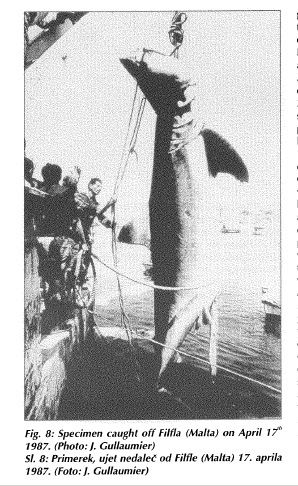How big can great white sharks grow?

There are many fishermen tales of shark lengths. Several unconfirmed reports have talked of 7.0-9.0m great white sharks. The infamous 6.0-7.0m False Bay white shark, dubbed "The Submarine" has a legend that stretches back to the 1970s. But what are the facts?
Undoubtly, large white sharks over 5.0m exist, but probably not close to shore where we are likely to see them. Recent stomach content analysis of white sharks found that larger white sharks had large squid beaks in their stomachs. Not seals. So perhaps these large sharks head for the high seas rather than seal colonies. "Once white sharks reach a certain size, we don't see them again," says Dyer Island Conservation Trust marine biologist, Oliver Jewell. "We have many individuals that were close to 5.0m in length, and after a few years they don't come back. We would like to think they are rather choosing to stay offshore." DICT zoologist, Michelle Wcisel, takes an evoluntionary approach, "Sharks existed well before marine mammals, so it seems logical to me that their diet is more primordial. Seals are probably a recent item to their diet in terms of their lineology."
The largest white shark ever caught and accurately measured in South Africa was 5.9m in length. This shark was caught off Danger Point of Gansbaai (not too far from our cage diving area!). The world record white shark so far stands at the 6.8m white shark caught at Malta, Italy. Yes, the Mediterranean Sea!

Get face to face with the great white shark, just book here and we will show you.
_1420x587_crop_80.jpg)






